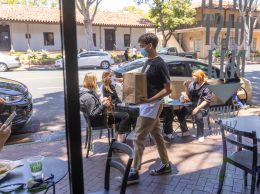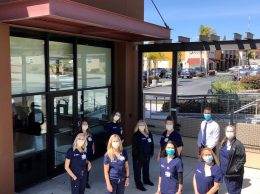The founders of Relentless say they see a new gold rush in the Irish Hills of San Luis Obispo, and they intend to strike a vein with a new model of venture investing.
The gold isn’t coming out of the ground, but out of universities and entrepreneurs in the form of software, they said.
The view is echoed by East Coast financial firms, said Charles Gerencser, partner and head of business development at Relentless.
“They see this as an untapped vein,” he said. “There’s this burgeoning growth in software and technology” illustrated by boutique fitness and salon software provider MindBody, which was recently acquired for $1.9 billion.
“That narrative has now got some of the biggest names on Wall Street looking at the Central Coast saying ‘where’s the next MindBody,’ ” said Gerencser.
The company wants to help scale those businesses and enable them to reach customers, said founder Alex Minicucci.
After a career of starting small businesses from the ground up, he decided there was a different approach to venture capital than simply
cutting a check.
Minicucci broke it down to what he called the “80/20 rule.” For entrepreneurs, around 80 percent of what it takes to get to market is the same across any business — infrastructure like human resources and payroll, sales and marketing, customer relations and office facilities, he said. What sets a company apart is the remaining 20 percent, but that can often get lost in simply trying to get the company off the ground.
There was an “obvious desire in the community for entrepreneurship, knowing most of them fail because of this 80 percent that they’re not good at,” Minicucci said.
With a current portfolio of five software companies, Relentless takes an equity stake in the firms in return for providing that infrastructure. That could include landing pages and giving firms access to a Business Development Center that houses a sales team with a network of around 40,000 small businesses throughout the U.S.
The greatest pain point for its Software-as-a-Service partners is how to “cost-effectively attack the market,” Gerencser said.
“We defray a lot of the risk. We’ve created the environment where we’re able to acquire sales at a much lesser outlay of dollars,” he said. “We already have an established relationship and a path that’s well-worn.”
The company targets software firms at a $3 million-$5 million valuation with technology that is largely developed, and aims to build them to an exit at $10 million-$25 million, usually through an acquisition. It interviewed around 60 firms to land on the five in its portfolio, Gerencser said, which focus largely on technology for small business, ranging from admin software for restaurants to gift card marketplaces and advertising in mobile gaming.
The company could potentially work with as many as 10 SaaS firms, he said, and is itself considering raising capital to build up additional resources. It intentionally built excess capacity into its business development center, he added, allowing it to contract with other non-equity companies and occasionally work with them ahead of taking an equity stake.
Now in its third year, Relentless has logged two exits since December, with the purchase of SMS Masterminds by Austin, Texas-based Aclate and Off Day Trainer by Bay Area firm Textmunication for unspecified amounts. As companies cycle through, they also open up bandwidth, Gerencser said.
Minicucci said he worked closely with the Cal Poly SLO Center for Innovation and Entrepreneurship and highlighted its progress in creating an ecosystem in support of entrepreneurship, relating Relentless to a “for-profit HotHouse.”
When he got his start 20 years ago, “If you wanted to make decent money (in SLO), you had to invent yourself a job,” he said. Now, “If you want to be here and you want to make money, you can’t sell something to people here. You have to be able to have a national audience or a global audience. Software gives you the opportunity to do that. We can build our software here and sell it to somebody in New York this afternoon.”
Software matches the ethos and talent on the Central Coast, Gerencser said, and could help provide head-of-household jobs to replace the 1,500 or so that will be lost with the closure of the Diablo Canyon Nuclear Power Plant in 2025.
But Relentless isn’t looking to be a “unicorn factory,” he clarified.
“We want to build a reputation around Relentless that when we build a company, it’s a real meat and potatoes kind of company,” Minicucci said. “When someone’s ready to buy it, it’s squeaky clean. That’ll take years, but that’s our focus, to take a company and really design it nicely so that when it’s time for an exit, it’s just right.”
• Contact Marissa Nall at mnall@pacbiztimes.com.






 Print
Print Email
Email
















